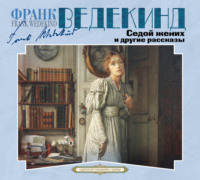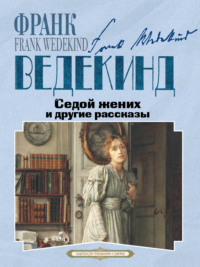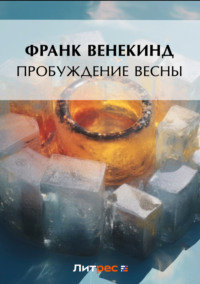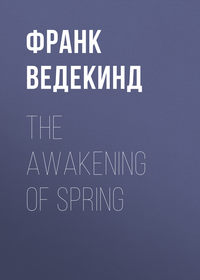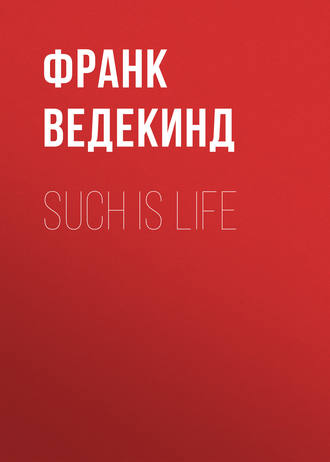 полная версия
полная версияSuch is Life

Frank Wedekind
Such is Life: A Play in Five Acts
CHARACTERS
Nicola, King of Umbria.
Princess Alma, his daughter.
Pietro Folchi, Master Butcher. }
Filipo Folchi, his soil. }
Andrea Valori } Citizens of Perugia.
Benedetto Nardi }
Pandolfo, Master Tailor. }
A Soldier.
A Farmer.
A Vagabond.
Michele }
Battista } Journeymen Tailors.
Noe }
The Presiding Judge.
The King's Attorney General.
The Advocate.
The Clerk of the Court.
The Jailer.
A Circus Rider.
An Actor.
A Procuress.
First Theatre Manager.
Second Theatre Manager.
A Page.
First Servant.
Second Servant.
Artisans, judges, townspeople, strollers, theatre audience, theatre servants, soldiers and halberdiers.
ACT I
Scene One—The Throne Room
FIRST SERVANT.
(Leaning out of the window.) They are coming! It will overtake us like the day of judgment!
SECOND SERVANT.
(Rushing in through the opposite door.) Do you know that the King is taken?
FIRST SERVANT.
Our King a captive?
SECOND SERVANT.
Since early yesterday! The dogs have thrown him into prison!
FIRST SERVANT.
Then we had better scamper away, or they will treat us as if we were the beds upon which he has debauched their children!
(The servants rush out. The room becomes filled with armed workmen of various trades, heated and blood-splashed from combat.)
PIETRO FOLCHI.
(Steps from their midst.) Fellow-citizens!—The byways of Perugia are strewn with the corpses of our children and our brothers. Many of you have a pious wish to give your beloved dead a fitting resting place.—Fellow-citizens! First we must fulfill a higher duty. Let us do our part as quickly as possible, so that the dead shall have perished, not solely for their bravery, but for the lasting welfare of their native-land! Let us seize the moment! Let us give our state a constitution which, in future, will protect her children from the assassin's weapons and insure her citizens the just reward of their labors!
THE CITIZENS.
Long live Pietro Folchi!
ANDREA VALORI.
Fellow-citizens! Unless we decide at once upon our future form of government, we shall only be holding this dearly captured place for our enemies until we lose it again. We are holding the former King in custody in prison; the patricians, who supported themselves in idleness by the sweat of our brows, are in flight toward neighboring states. Now, I ask you, fellow-citizens, shall we proclaim our state the Umbrian Republic, as has been done in Florence, in Parma, and in Siena?
THE CITIZENS.
Long live Freedom! Long live Perugia! Long live the Umbrian Republic!
PIETRO FOLCHI.
Let us proceed without delay to elect a podesta! Here are tables and styles in plenty. Let each one write the name of the man whom he considers best fitted to guide the destiny of the state and to defend the power we have gained from our enemies.
THE CITIZENS.
Long live our podesta, Pietro Folchi! Long live the Republic of Perugia!
ANDREA VALORI.
Fellow-citizens! Let there be no precipitate haste at this hour! It is necessary to strengthen so the power we have won that they cannot prevail against us as long as we live. Would we succeed if we made Umbria a republic? Under the shelter of republican liberty, the sons of the banished nobles would use the vanity of our daughters to bind us again in chains while we slept unsuspectingly at night! Look at Florence! Look at Siena! Is not liberty in those states only the cloak of the most dissolute despotism, which is turning their citizens to beggars? Perugia grew in power and prosperity under her kings, until the sceptre passed into the hands of a fool and a wastrel. Let us raise the worthiest of us up to his throne. Then we who stand here exhausted from the conflict, will become the future aristocracy and the lords of the land; only then can we enjoy in lasting peace our hard won prerogatives.
THE CITIZENS.
Long live the king! Long live Pietro Folchi!
A FEW VOICES.
Long live Freedom!
THE CITIZENS.
(Louder.) Long live our king, Pietro Folchi! Long live King Pietro!
A FEW CITIZENS.
(Leaving the room angrily.) We did not shed our blood for this. Down with slavery! Long live Freedom!
THE CITIZENS.
Hurrah for King Pietro!
PIETRO FOLCHI.
(Mounting the throne.) Called to it by your choice, I mount this throne and name myself King of Umbria! The dissatisfied who have separated from our midst with the cry of "freedom" are no less our enemies than the idle nobles who have turned their backs to our walls. I shall keep a watchful eye on them, as they fought on our side only in the hope of plundering in the ruins of our beloved city. Where is my son Filipo?
FILIPO FOLCHI.
(Stepping from out the press.) What is your will, my father?
KING PIETRO.
From the wounds above your eyes, I see that you did not shun death yesterday or today! I name you commander of our war forces. Post our loyal soldiers at the ten gates of the city, and order the drum to beat in the market place for recruits. Perugia must be armed for an expedition to its frontiers in the shortest possible time. You will be answerable to me for the life of every citizen and responsible for the inviolate safety of all property. Now bring the former king of Umbria forth from his prison. It is proper that none save I announce to him his sentence.
FILIPO.
Your commands shall be observed punctually. Long live King Pietro! (Exit.)
KING PIETRO.
Where is my son-in-law, Andrea Valori?
ANDREA VALORI.
(Stepping forward.) Here, my king, at your command!
KING PIETRO.
I name you treasurer of the Kingdom of Umbria. You and my cousin, Giullio Diaceto, together with our celebrated jurist, Bernardo Ruccellai, whose persuasive words abroad have more than once preserved our city from bloodshed; you three shall be my advisors in the discharge of affairs of state. (After the three summoned have come forward.) Seat yourselves beside me. (They do so.) I can only fulfill the high duty of ruling others if the most able men in the state will enlist their lives in my service. And now, let the others go to bury the victims of this two days' conflict. To show that they did not die in vain for the welfare of their brothers and children, let this be a day of mourning and earnest vigilance.
(All leave the room save King Pietro, the Councillors and several guards. Then the captive King is led in by Filipo Folchi and several armed men.)
THE KING.
Who is bold enough to dare bring us here at the bidding of these disloyal knaves?!
KING PIETRO.
According to the provision of our laws, the royal power in Umbria fell to you as eldest son of King Giovanni. You have used your power to degrade the name of a king with roisterers and courtesans. You chose banquets, masquerades and hunting parties, by which you have dissipated the treasures of the state and made the country poor and defenseless, in preference to every princely duty. You have robbed us of our daughters, and your deeds have been the most corrupting example to our sons. You have lived as little for the state's welfare as for your own. You accomplished only the downfall of your own and our native land.
THE KING.
To whom is the butcher speaking?
FILIPO FOLCHI.
Silence!
THE KING.
Give me back my sword!
ANDREA VALORI.
Put him in chains! He is raving!
THE KING.
Let the butcher speak further.
KING PIETRO.
Your life is forfeited and lies in my hands. But I will suspend sentence of death if in legal document you will relinquish in my favor, and in favor of my heirs, your claim and that of your kin to the throne, and acknowledge me as your lord, your rightful successor and as the ruler of Umbria.
THE KING.
(Laughs boisterously.) Ha, ha, ha! Ask of a carp lying in the pan to cease to be a fish! That this worm has our life in his power proves indeed that princes are not gods, because, like other men, they are mortal. The lightning, too, can kill; but he who is born a king does not die like an ordinary mortal! Let one of these artisans lay hands upon us, if his blood does not first chill in his veins. Then he shall see how a king dies!
KING PIETRO.
You are a greater enemy to yourself than your deadliest foes can possibly be. Although you will not abdicate, we will be mild, in thankful remembrance of the blessed rule of King Giovanni, whose own son you are, and banish you now and forever from the confines of the Umbrian States, under penalty of death.
THE KING.
Banish! Ha, ha, ha! Who in the world will banish the King! Shall fear of death keep him from the land of which Heaven appointed him the ruler? Only an artisan could hold life so dear and a crown so cheap!–Ha, ha, ha! These pitiable fools seem to imagine that when a crown is placed upon a butcher he becomes a king! See how the paunch-belly grows pale and shivers up there, like a cheese flung against the wall! Ha, ha, ha! How they stare at us, the stupid blockheads, with their moist dogs' eyes, as if the sun had fallen at their feet!
PRINCESS ALMA.
(Rushes in, breaking through the guards at the door. She is fifteen years old, is clad in rich but torn garments and her hair is disheveled.) Let me pass! Let me go to my father! Where is my father? (Sinking down before the King and embracing his knees.) Father! Have I you again, my dearly beloved father?
THE KING.
(Raising her.) So I hold you unharmed in my arms once more, my dearest treasure! Why must you come to me with your heartrending grief just at this moment when I had almost stamped these bloodthirsty hounds beneath my feet again!
ALMA.
Then let me die with you! To share death with you would be the greatest happiness, after what I have lived through in the streets of Perugia these last two days! They would not let me come to you in prison, but now you are mine again! Remember, my father, I have no one else in the world but you!
THE KING.
My child, my dear child, why do you compel me to confess before my murderers how weak I am! Go! I have brought my fate upon myself, let me bear it alone. These men will confirm it that you may expect more compassion and better fortune from my bitterest enemies than if you cling now to your father, broken by fate.
ALMA.
(With greatest intensity.) No, do not say that! I beseech you do not speak so again! (Caressingly.) Only remember that it is not yet decided that they murder us. And if we had rather die together than be parted who in the world can harm us then!
KING PIETRO.
(Who during this scene has quietly come to an agreement with his councillors, turning to the King.) The city of Perugia will give your daughter the most careful education until her majority; and then bestow upon her a princely dower; if she will promise to give her hand in marriage to my son, Filipo Folchi, who will be my successor upon this throne.
THE KING.
You have heard, my child? The throne of your father is open to you!
ALMA.
O my God, how can you so scoff at your poor child!
KING PIETRO.
(To the King.) As for you, armed men under the command of my son shall conduct you, within this hour, to the confines of this country. Have a care that you do not take so much as a step within our land hereafter, or your head shall fall by the hand of the executioner in the market place of Perugia!
(Filipo Folchi has the King and the Princess, clinging close to her father, led off by men-at-arms. He is about to follow them, when his arm is seized by Benedetto Nardi, who rushes in breathless with rage.)
BENEDETTO NARDI.
Have I caught you, scoundrel! (To King Pietro.) This son of yours, Pietro Folchi, in company with his drunken comrades, chased my helpless child through the streets of the city yesterday evening, and was about to lay hands on her when two of my journeymen, attracted by her cries, put the scoundrels to flight with their clubs. The wretch still carries the bloody mark above his eyes!
KING PIETRO.
(In anger.) Defend yourself, my son!
FILIPO FOLCHI.
He speaks the truth.
KING PIETRO.
Back to the shop with you! Must I see my rule disgraced on its first day by my own son in most impious fashion! The law shall work its greatest hardship upon you! Afterward you shall stay in the butcher shop until the citizens of Perugia kneel before me and beg me to have pity on you! Put him in chains!
(The mercenaries who led out the King return with Alma. Their leader throws himself on his knees before the throne.)
THE MERCENARY.
O Sire, do not punish your servants for this frightful misfortune! As we were leading the King just here before the portal across the bridge of San Margherita, a company of our comrades marched past and pressed us against the coping. The prisoner seized that opportunity to leap into the flood swollen by the rain. We needed all our strength to prevent this maiden from doing likewise, and when I was about to leap after the prisoner, the raging waves had long engulfed him.
KING PIETRO.
His life is not the most regrettable sacrifice of these bloody days! Hundreds of better men have fallen for him. (To the Councillors.) Let the child be taken to the Urseline nuns and kept under most careful guard. (Rising.) The sitting of the counsel is closed.
ALL PRESENT.
Long live King Pietro!
Scene Two
A highway along the edge of a forest(The King and Princess Alma, both clad as beggars.)THE KING.
How long have I been dragging you from place to place while you begged for me?
ALMA.
Rest yourself, Father; you will be in better spirits afterward.
THE KING.
(Sits down by the wayside.) Why did not the raging waves swallow me that evening! Then everything would have been over long ago!
ALMA.
Did you leap over the side of the bridge to put an end to your life? I thought what strength resided in your arms and that the rushing waters would help you to liberty. Without this faith how should I have had the courage to escape from the convent and from the city?
THE KING.
Below us here lies the rich hunting grounds where I have often ridden hawking with my court. You were too young to accompany us.
ALMA.
Why will you not leave this little land of Umbria, my father! The world is so large! In Siena, in Modena, your friends dwell. They would welcome you with joy, and at last your dear head would be safe.
THE KING.
You offer me much, my child! Still, I beg of you not to keep repeating this question. Just in this lies my fate: If I were able to leave this land, I should not have lost my crown. But my soul is ruled by desires which I cannot relinquish, even to save my life. As king, I believed myself safe enough from the world to live my dreams without danger. I forgot that the king, the peasant and every other man, must live only to preserve his station and to defend his estate, unless he would lose both.
ALMA.
Now you are scoffing at yourself, my father!
THE KING.
That is the way of the world!–You think I am scoffing at myself?–That, at least, might be something for which men would contribute to our support. As I offer myself to them now I am of no use. Either I offend them by my arrogance and pride, which are in ridiculous contrast to my beggar's rags, or my courteous demeanor makes them mistrustful, as none of them succeeds by simple modesty. How my spirit has debased itself during these six months, in order to fit itself to their ways and methods! But everything I learned as hereditary prince of Umbria is valueless in their world, and everything which is of worth in their world I did not learn as a prince. But if I succeed in jesting at my past, my child, who knows but what we may find again a place at a richly decked table! When the pork butcher is raised to the throne there remains no calling for the king save that of court fool.
ALMA.
Do not enrage yourself so in your fatigue, my father. See, you must take a little nap! I will look for fresh water to quench your thirst and cool your fevered brow.
THE KING.
(Laying down his head.) Thank you, my child.
ALMA.
(Kissing him.) My dear father! (Exit.)
THE KING.
(Rises.) How I have grown to love this beautiful land since I have slunk about it at the risk of my life! –Even the worst disaster always brings good with it. Had I not cared so little for my brave people of Perugia and Umbria, had I not shown myself to them only at carnivals and in fancy dress, God knows, but I might have been recognized long ago! Here comes one of them now!
(A landed proprietor comes up the road.)
THE KING.
God greet you, sir! Can you not give me work on your estate?
THE LANDED PROPRIETOR.
You might find much to recompense your work on my estate, but, thank God, my house is guarded by fierce wolf hounds. And here, you see, I carry a hunting knife, which I can use so well that I should not advise you to come a step nearer me!
THE KING.
Sir, you have no guarantee from Heaven that you may not be compelled at some time to beg for work in order not to go hungry.
THE LANDED PROPRIETOR.
Ha, ha, ha! He who works in order not to go hungry, he is the right kind of worker for me! First comes work and then the hunger. Let him who can live without work starve rather today than tomorrow!
THE KING.
Sir, you must have had wiser teachers than I!
THE LANDED PROPRIETOR.
I should hope so! What have you learned?
THE KING.
The trade of war.
THE LANDED PROPRIETOR.
Thank God, under the rule of King Pietro, whom Heaven long preserve to us, there is little use for that in Umbria any longer. City and country enjoy peace, and at last we live in concord with neighboring states.
THE KING.
Sir, you will find me of use for any work on your estate.
THE LANDED PROPRIETOR.
I will think over the matter. You appear a harmless fellow. I am on my way to my nephew, who has a large house and family at Todi. I am coming back this afternoon. Wait for me here at this spot. Possibly I will take you with me then. (Exit.)
THE KING.
"Let him who can live without work starve." What old saws this vermin cherished to endure his miserable existence! And I?–I cannot even feed my child! A lordship was given me by Heaven such as only one in a million can have! And I cannot even give my child food!–My kind father made every hour of the day a festival for me by means of joyous companions, by the wisest, teachers, by a host of devoted servants, and my child must shiver with cold and sleep under the hedges by the highway! Have pity on her, O God, and blot her love for miserable me out of her heart! Let happen to me then whatever will, I will bear it lightly!
ALMA.
(Rushes out of the bushes with her hair tumbling down.) Father! Jesu Maria! My father! Help!
THE KING.
(Clasping her in his arms.) What is it, child?
A VAGABOND.
(Who has followed the maiden, comes forward and stops.) Ah!—How could I know another had her!
THE KING.
(Rushes upon him with uplifted stick.) Hence, you dirty dog!
THE VAGABOND.
I a dirty dog! What are you, then?
THE KING.
(Striking him.) That am I!—And that!—And that!
(The vagabond seeks refuge in flight.)
ALMA.
(Trembling in her father's arms.) O Father, I was leaning over the spring when that man sprang at me!
THE KING.
(Breathing hard.) Calm yourself, my child
ALMA.
My poor father! That I, instead of being able to help you, must still need your help!
THE KING.
Today I shall take you back to Perugia. Will throw you at King Pietro's feet–
ALMA.
Oh, do not let me hear of that again! Can I leave you when death threatens you daily?
THE KING.
It would be better for you to wear man's clothes, instead of a woman's dress, in the future. It is marvel enough that Providence has protected you until today from the horrors that threaten you in our wanderings! You will be safer in man's clothes. A countryman just passed this way. When he comes back he will take me with him and give me work on his place.
ALMA.
Will you really seek again to put yourself in the service of those so abyssmally beneath you?
THE KING.
What are you saying, my child! Why are they below me?–Besides, it is not quite certain that he will find me worthy of his work. If he asks me to go with him, then follow us, so that I can turn my place under his roof over to you at night.
ALMA.
No, no! You must not suffer hardship on my account. Have I deserved that of you?
THE KING.
Do you know, my child, that if I had not had you with me, my treasure, as guardian angel, I should very probably be hanging today on a high gallows for highway robbery?–(He sits down again by the road-side.) And now, let us tarry here in patient expectation of the all-powerful man whose return will decide whether our desire to live in communion with mankind is to be fulfilled.
ACT II
Scene One
THE WORKSHOP OF A LADIES' TAILOR(The King, in journeyman's clothes, sits cross-legged on a table,working on a woman's gown of rich materialMaster Pandolfo bustles into the room.)MASTER PANDOLFO.
Early to work, Gigi! Early to work! Bravo, Gigi!
THE KING.
The cock has crowed, Master!
MASTER PANDOLFO.
Now shake me the other fellows awake. One can work better in company than alone, Gigi! (Takes the dress out of his hands.) See here, Gigi! (He tears the dress.) Rip! What's the use of early to bed and early to rise if the stitches don't hold? And the button-holes, Gigi! Did the rats help you with them? I worked for Her Majesty Queen Amelia when her husband was still making mortadella and salmi. Am I to lose her custom now because of your botching? Hey, Gigi?
THE KING.
If my work shames you, turn me out!
MASTER PANDOLFO.
How rude, Gigi! Do you think you are still tending pigs at Baschi? Forty years on your back and nothing learned! Go packing out of my house and see where you will find your food, then, you vagabond!
THE KING.
(Rises and collects the scraps.) I'll take you at your word, Master!
MASTER PANDOLFO.
What the devil, madcap; can't you take a joke? Can I show more love toward my 'prentice than I do when I give him the work which usually the master does? Since you have been with me haven't I allowed you to cut all the garments? The devil take me that I cannot catch the knack of your cutting! But the ladies of Perugia say, "Master Pandolfo, since the old apprentice has been working for you, your work has a genteel cut." But what's the use of a genteel cut if the young ladies tear the stitches out as they dance? You'll never be a journeyman, Gigi, unless you learn to sew. My dear, sweet Gigi, don't you see that I only want what's best for you?
THE KING.
Good, Master Pandolfo, I'll stay with you if from now on, in addition to my keep, you will pay me thirty soldi more a week.
MASTER PANDOLFO.
I'll promise you that, Gigi! As true as I stand here, I'll promise you that!–Thirty soldi you want?–Yes, yes! The gown for her Majesty, the Queen, must be ready sewed by noon. Therefore, be industrious, Gigi! Always industrious! (Exit.)
(The King dimes a long breath after Master Pandolfo leaves the room, and then sits down to his work again. After a while, Princess Alma puts her head in through the window.)
ALMA.
Are you alone, Father?
THE KING.
(Springing up joyfully.) My treasure!
(Alma vanishes and immediately after comes in through the door. She is dressed as a boy in a dark, neat suit of clothes.)


